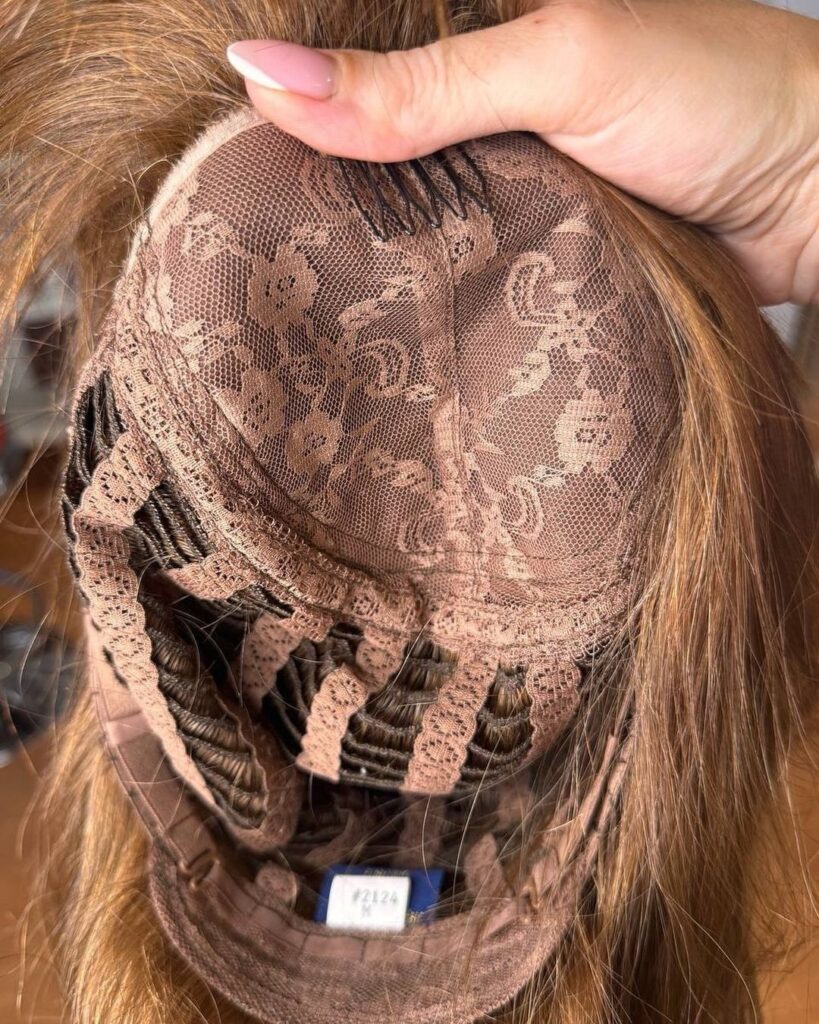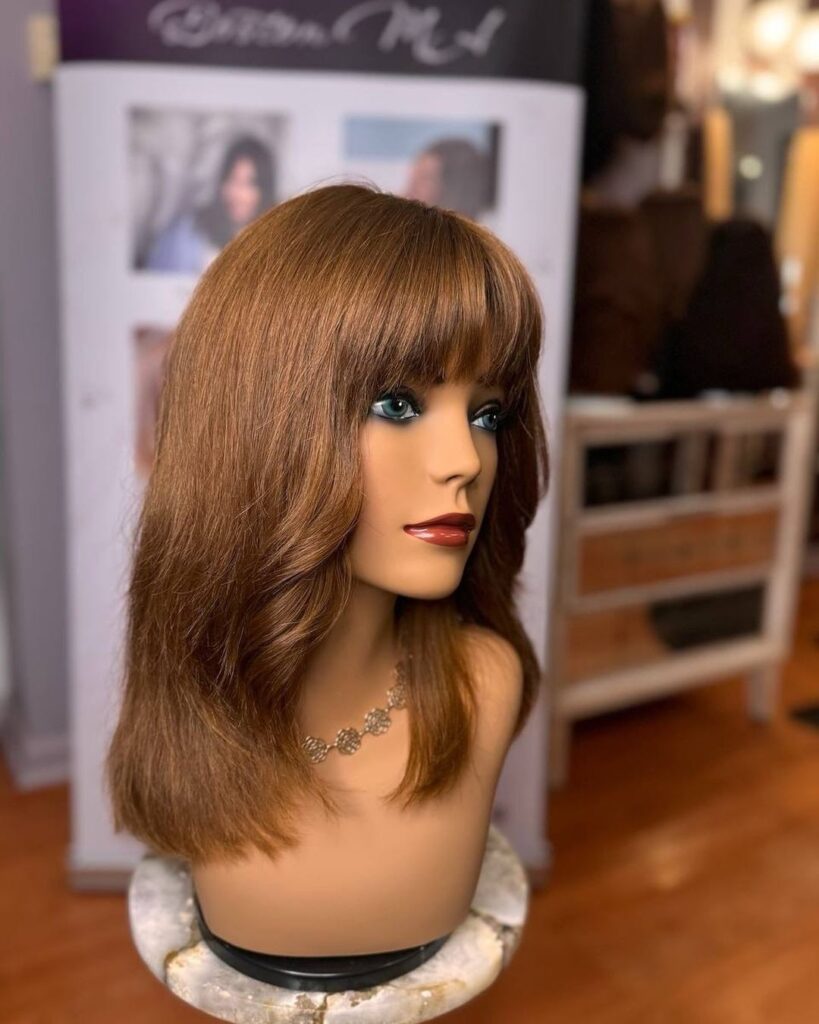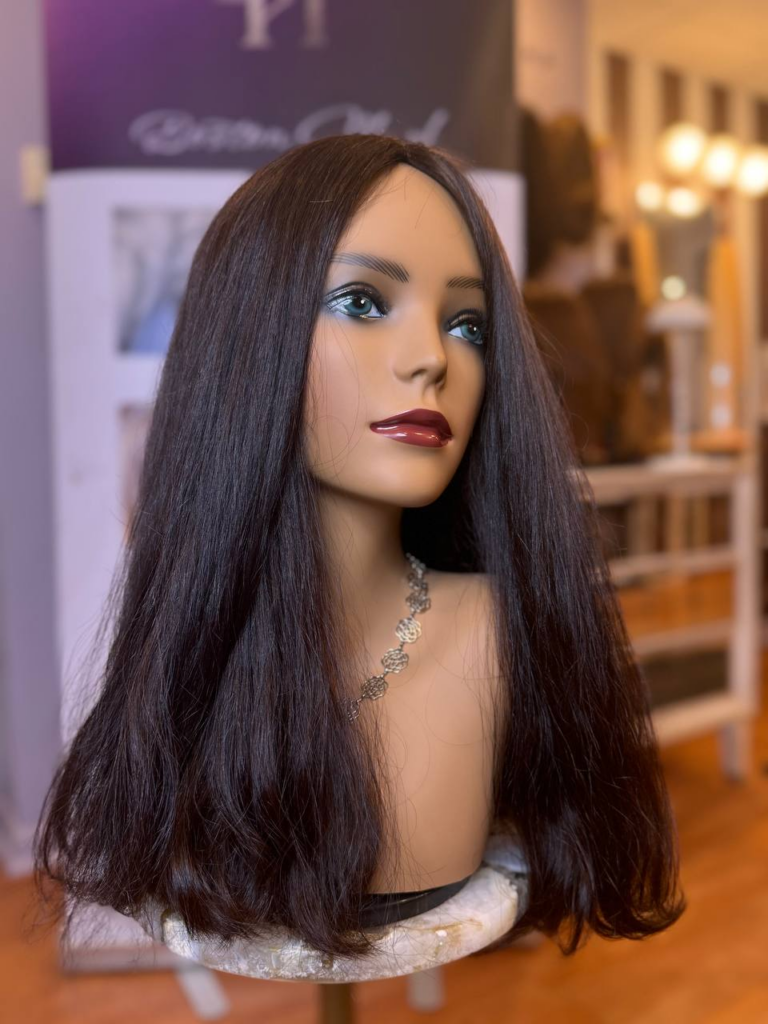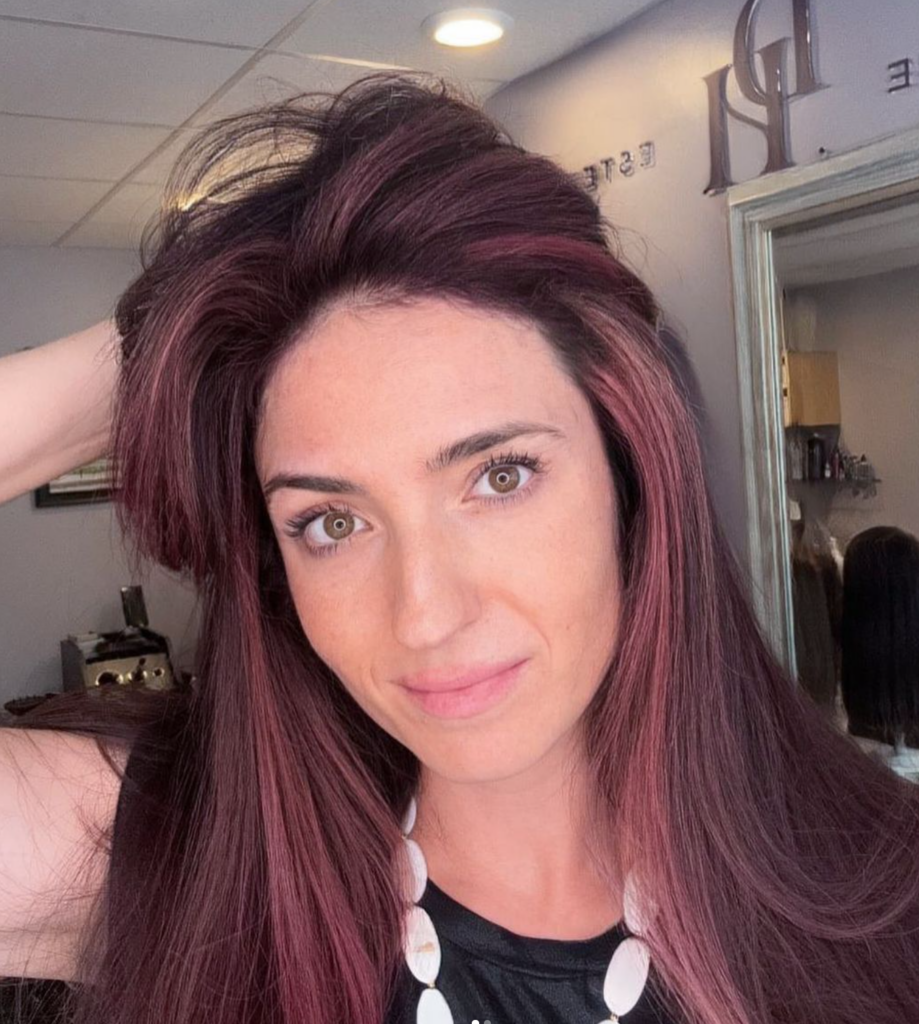If you’re searching for a ‘hair prosthesis near me’ or exploring ‘hair replacement systems,’ you want effective local solutions for hair loss. This guide will help you find nearby specialists, understand the types of prostheses available, and offer tips on maintenance. Discover how professional consultations and quality care can make a difference.
Key Takeaways
- Finding a qualified hair prosthesis specialist is essential for personalized consultation and tailored solutions to meet individual hair loss needs.
- Hair prostheses offer multiple benefits, including increased confidence, versatile styling options, and a natural appearance compared to traditional wigs.
- Understanding insurance coverage for hair prostheses can significantly ease financial burdens, especially for those with medical conditions that cause hair loss.
Hair Prosthesis: Understanding Hair Loss
Hair loss can be a distressing experience, impacting self-esteem and overall quality of life. It can stem from various medical conditions, including cancer, alopecia, and genetic disorders, or be triggered by treatments like chemotherapy. Hormonal imbalances, stress, and certain medications can also contribute to hair loss. Understanding the underlying cause is crucial in determining the best course of treatment. Consulting with a cranial prosthesis specialist can provide valuable insights and tailored solutions for those experiencing hair loss due to medical conditions or treatments. These specialists work closely with patients to identify the root cause and recommend the most suitable hair prosthesis options, ensuring a personalized and practical approach to managing hair loss.
Discover the Elegance of Slavic Beauty!
Explore Our Full Catalog of Slavic Wigs
What is a Hair Prosthesis?
A hair prosthesis is a custom-made solution designed for individuals experiencing hair loss. Unlike traditional wigs, hair prostheses are specifically crafted to meet the unique needs of those with hair loss due to medical conditions or treatments. They can be made from synthetic hair, human hair, or a combination of both, providing a natural-looking and comfortable hair replacement. Hair prostheses can be attached to the scalp using adhesives, tapes, or clips or even sewn onto the scalp, ensuring a secure fit. This makes them an ideal option for individuals with hair loss due to cancer, alopecia, or other medical conditions. The versatility and customization of hair prostheses allow for a seamless blend with existing hair, offering a practical and aesthetically pleasing solution for those seeking to regain their confidence and appearance.
Finding a Hair Prosthesis Specialist Near You
Finding a hair restoration and prosthesis specialist is a significant step towards regaining confidence and appearance. These experts provide comprehensive services, including consultation, selection, and styling to ensure your hair prosthesis looks and feels natural. A qualified professional will guide you through the process, tailoring the prosthesis to your specific needs and preferences.

Local salons like DH Estetika offer personalized hair prosthesis services in a comfortable and supportive environment. Salon allows you to explore various options and find the perfect fit. These services often include cutting, styling, and maintenance to keep your prosthesis looking its best.
For instance, DH Estetika in Boston’s historic South End is renowned for its welcoming atmosphere and specialized hair prosthesis services.
Curious about the tradition of Jewish wigs? Dive into the history, significance, and evolving trends of sheitels. Read now!
Importance of Professional Consultation About Hair Prosthesis
A professional consultation is crucial in the hair prosthesis selection process. During this meeting, a cranial prosthesis specialist collaborates with board-certified dermatologists to assess your situation and recommend the best hair replacement options. This personalized approach ensures the prosthesis matches your aesthetic desires and fits your medical needs and lifestyle well.
The consultation involves discussing your hair loss condition, exploring various prosthesis options, and creating a customized treatment plan. This meticulous approach ensures you receive a prosthesis tailored to your head shape and medical requirements, enhancing comfort and appearance.
Follow-up appointments and detailed care instructions are also provided to help you maintain your prosthesis effectively.
Local Salon DH Estetika
Locating local wig salons specializing in hair prostheses can significantly ease managing hair loss. These establishments offer a range of services for individuals experiencing hair loss due to medical conditions like cancer or alopecia. For instance, the Pixie Hair Replacement service covers shampooing, conditioning, weave application, cutting, styling, and even color treatments if needed.
Cranial prostheses differ from traditional wigs as they are specifically designed for medical purposes. They offer better comfort, fit, and temperature regulation, making them ideal for cancer patients undergoing treatments like chemotherapy. Medical wigs provide an additional option for those in need.
Beauty salon DH Estetika in Boston provides these specialized prostheses and creates a cozy and supportive environment for their clients, ensuring a positive experience.
Types of Hair Prostheses Available
Hair prostheses come in various forms to address hair loss and lifestyle needs. Whether dealing with alopecia, undergoing chemotherapy, or experiencing other forms of medical hair loss, there’s a prosthesis that can meet your requirements, including custom hair systems. These offer a non-invasive solution that can blend seamlessly with your existing hair or provide full coverage.
Versatility is a crucial advantage of hair prostheses. They can be customized to match your preferred style and color, ensuring you feel confident and look your best. From synthetic hair options to those made with natural hair, the range of choices perfectly matches your personal aesthetic and practical needs.
Custom-Made vs. Ready-to-Wear Prostheses
Several factors come into play when choosing between custom-made and ready-to-wear hair prostheses. Custom-made prostheses are explicitly designed for your head shape and hair loss pattern, offering a tailored fit that enhances comfort and stability. These can be particularly beneficial for individuals with specific medical conditions, as they can be crafted to meet unique requirements.
Ready-to-wear prostheses also have their advantages. They are generally more budget-friendly and provide immediate availability, making them a convenient choice for those needing a quick solution. While they may not offer the same level of customization as their bespoke counterparts, they still come in various styles and colors to suit different preferences.
Benefits of Hair Prostheses

Hair prostheses offer numerous benefits beyond merely covering up hair loss. Thanks to the seamless hair integration they provide, many individuals report significant improvements in their confidence and overall appearance after using these prostheses. The psychological boost from seeing a reflection that aligns with your feelings can be transformative. This renewed self-esteem often leads to better social interactions and a higher quality of life.
Hair prostheses provide versatility in styling, allowing you to experiment with different looks and find what suits you best. Whether aiming for a natural everyday style or something more glamorous for special occasions, there’s a prosthesis that can help you achieve your desired look. This flexibility makes them a practical solution and an exciting opportunity to express personal style.
Boosting Confidence and Appearance
The impact of hair replacement solutions on confidence and appearance is profound. Many users describe the emotional relief and satisfaction they feel after getting a prosthesis, as it helps restore a sense of normalcy and attractiveness. Before-and-after transformations often highlight dramatic improvements in hairstyle and overall facial aesthetics, showcasing how a suitable prosthesis can make a significant difference.
For women, hair loss can be a profoundly emotional experience affecting self-esteem and social interactions. Hair prostheses offer a way to regain this lost confidence. Testimonials highlight how these prostheses help users reclaim their identity and feel more attractive and confident.
Versatility and Style Options
A standout benefit of hair systems and hair prostheses is their versatility. They come in many styles, from short pixie cuts to long, flowing locks, allowing individuals to choose looks that suit personal preferences and lifestyles. Customizing the color, length, and texture further enhances this versatility, enabling users to create a hairstyle that feels uniquely theirs.
Hair prostheses are designed to be worn in various environments, whether for a casual outing or a formal event. This adaptability makes them an excellent choice for anyone looking to maintain a consistent and stylish appearance regardless of the situation.
With so many options available, finding the perfect fit for your style and needs becomes enjoyable and empowering.
How to Care for Your Hair Prosthesis
Proper care is essential to maintain the appearance and longevity of your hair prosthesis. While they require less maintenance than traditional wigs, some daily upkeep is still necessary. Regular cleaning of both the prosthesis and your scalp is crucial to prevent odors and maintain hygiene. Periodic maintenance can help prevent visible deterioration and ensure your prosthesis remains in top condition.
Effective care involves using the right products and techniques. Services like shampooing, conditioning, and restyling are part of the extensive maintenance required for hair prostheses. These steps help preserve the integrity of the hairpiece and keep it looking natural.
Whether handling maintenance yourself or seeking professional services, following a consistent care routine is key to enjoying the full benefits of your hair prosthesis.
Daily Maintenance Tips
Hair system maintenance is crucial for caring for your hair prosthesis. Regularly removing and cleaning the prosthesis can help maintain its appearance and your scalp health. Using products designed for dry or colored hair can prevent the hairpiece from drying out and ensure it remains soft and manageable. Proper cleaning methods, such as warm water and gentle shampoos, prevent unpleasant odors and maintain the prosthesis’s integrity.
Proper storage of your prosthesis when not in use is crucial. Keeping it in a cool, dry place and using a breathable bag can protect it from dust and damage. Limiting heat during cleaning and using a towel or cool air to dry the hair can also help prolong the life of your prosthesis.
Cleaning and Storage Guidelines
Proper hairpiece care, including cleaning and storage of your hair prosthesis, is vital to keep it looking fresh and natural. Use gentle, sulfate-free shampoos and conditioners to clean the hairpiece, ensuring thorough rinsing to remove all product residues. Avoid excessive heat during cleaning, as this can damage the hair fibers. Instead, let your prosthesis air dry on a wig stand to maintain its shape and quality.
Always keep your prosthesis in a cool, dry place. Using a breathable bag can help protect it from dust and other environmental factors that could cause damage. Regular maintenance through proper cleaning and storage can significantly extend the lifespan of your prosthesis, ensuring it continues to look its best.
your policy, such as ‘cranial hair prosthesis,’ can also improve your chances of getting coverage approved.
Filing Reimbursement Claims
Filing a reimbursement claim for a hair replacement prosthesis involves gathering all necessary documentation and following a structured process. Start by obtaining a prescription from your doctor and a letter of medical necessity outlining hair loss’s emotional and physical impacts. Collect all receipts related to the purchase of the prosthesis and complete the claims form provided by your insurance company.
Submit your claim form and supporting documentation by mail or electronically, depending on your insurer’s process. After submission, follow up with your insurance company to ensure the claim is processed and promptly address any issues. This proactive approach can help ensure a smoother reimbursement process.
Additional Tips for Managing Hair Loss
Hair restoration treatments go beyond just finding the right hair prosthesis. Incorporating additional strategies can significantly improve your overall hair health and well-being. Protecting your scalp and ensuring proper nutrition are crucial steps in this journey. By focusing on these areas, you can enhance the effectiveness of your hair prosthesis and support any existing hair growth efforts.
You can take practical measures to protect your scalp from environmental damage and promote a healthy environment for hair growth. Additionally, adopting a balanced diet rich in essential nutrients can provide the foundation for healthier hair and potentially slow down the process of thinning hair and hair loss.
Scalp Protection and Care
Proper scalp treatments are essential, especially if you are experiencing hair loss or wearing a hair prosthesis. Direct exposure to sunlight can damage the scalp, so you must cover your head with a scarf or hat made of natural fabrics. This shields your scalp from harmful UV rays, helps regulate temperature, and prevents excessive sweating.
Incorporating additional layers of protection, such as hats or scarves, can further enhance scalp safety and comfort. Regularly cleaning your scalp and using gentle products can help maintain its health.
Avoiding hot water on your scalp is crucial, as it can expand pores and increase hair loss. Opt for warm water instead, and limit the use of heat styling tools to prevent drying out your scalp and hair.
Nutritional Support for Hair Growth
Hair growth treatments and nutrition are pivotal in supporting hair growth and overall hair health. Including foods rich in omega-3 fatty acids, such as salmon and flaxseeds, can promote healthier hair growth. Protein is another essential nutrient, as hair is primarily made up of a protein called keratin. Consuming a diet high in protein-based foods can help speed up hair regeneration and strengthen existing hair.
Essential fatty acids are crucial for maintaining healthy hair and preventing scalp issues. A deficiency in these nutrients can lead to hair loss and other hair-related problems.
Additionally, consider trying hair mesotherapy scalp treatments with a vitamin cocktail to boost hair growth and improve the overall health of your scalp. Focusing on a balanced diet and incorporating these tips can support your hair’s health from the inside out.
Hair Prosthesis in Boston
In conclusion, hair replacement systems and prostheses offer a comprehensive solution for individuals experiencing hair loss. From the initial consultation with a cranial prosthesis specialist to selecting the perfect type of prosthesis, each step is crucial in achieving a natural and comfortable look. The benefits of hair prostheses are numerous, ranging from boosting confidence and enhancing appearance to offering versatile styling options.
Proper care and maintenance are essential to prolong the life of your hair prosthesis and keep it looking its best. Understanding insurance coverage and the process for filing reimbursement claims can also ease the financial burden of these prostheses. Additionally, you can further support your hair health by adopting scalp protection strategies and nutritional support. Embrace the journey toward regaining your confidence and explore the transformative power of hair prostheses.

Frequently Asked Questions
A cranial prosthesis is specifically designed for medical use. It provides superior fit, comfort, and temperature regulation compared to a regular wig, making it more suitable for individuals experiencing hair loss due to medical conditions.
To determine if your insurance covers a hair prosthesis, review your policy for terms like ‘cranial hair prosthesis’ and contact your insurer for confirmation and specific coverage requirements.
During the consultation, you can expect a thorough assessment of your hair loss and a discussion of personalized prosthesis options to create a tailored treatment plan that meets your needs.
It would be best to clean your hair prosthesis every 2-4 weeks using gentle, sulfate-free shampoos and conditioners. To preserve its shape, allow it to air dry on a wig stand.
To support hair growth, incorporate foods high in omega-3 fatty acids and increase your protein intake. These dietary changes can significantly enhance hair health and growth.






Comments +